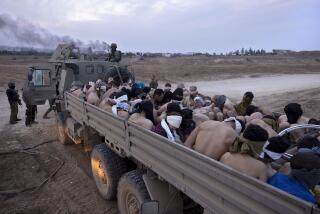Iraq wounded overwhelmed Walter Reed, chief says
- Share via
WASHINGTON — The head of the Army hospital responsible for most of the seriously injured war veterans has acknowledged that the staff responsible for tracking patients after they receive treatment was overwhelmed by the number of wounded when violence spiked in Iraq two years ago.
The undermanned staff may have led to wounded veterans falling through the bureaucratic and medical cracks, he said.
Army Maj. Gen. George W. Weightman, commander of the prestigious Walter Reed Army Medical Center, said the number of outpatient soldiers reached a high of 872 in summer 2005, up from about 100 before the war, leaving the military and medical staff responsible for monitoring their well-being unable to keep on top of critical cases.
“We found that the platoon sergeants that we had for accountability and the case managers that we had, they were literally managing 125 patients each,” Weightman said. “That’s too many to do [oversight] effectively.”
Walter Reed, located in northwest Washington, D.C., is renowned for its inpatient medical care, which has helped keep alive hundreds of soldiers who probably would have died during previous conflicts.
Less well-known is the care soldiers receive as outpatients, which has stretched to an average of 10 months -- two months longer than Army guidelines call for -- a period Weightman said can be even more frustrating for wounded soldiers and their families.
“When you’re an inpatient, you’re literally a captive in our organization,” Weightman said. “When you’re an outpatient, there’s a lot more options that you have as a patient as far as where you can go and who accounts for you. That was, in some cases, a problem.”
Weightman’s acknowledgment, made during a briefing Friday for a small group of reporters, came ahead of a Washington Post investigation to be published today that details multiple cases of soldiers who accused Walter Reed of neglecting them and forcing them to live in substandard wards on the medical center’s campus once they became outpatients.
The Post story includes allegations that one outpatient soldier at Walter Reed drank himself to death, and two others died in a high-speed car accident even though the driver was supposed to be restricted to medical center grounds because of past use of illegal drugs.
Weightman, who took command of Walter Reed in July, said he has quadrupled the number of staff responsible for serving as liaisons between outpatients and the review boards charged with deciding whether to discharge outpatients or return them to active duty.
He also said he is increasing the number of military officers and case workers handling individual outpatients so that every caregiver will only have to handle 30 to 35 veterans.
Weightman insisted he has also ordered his staff to focus on “high-risk” cases, such as veterans with post-traumatic stress disorder or traumatic brain injuries, to insure they are more closely monitored once they become outpatients.
“Maintaining quick accountability at all times on those, it generates a lot less problems for us downrange,” Weightman said. “They’re the folks that are at risk of not being where they’re supposed to be, or getting on a motorcycle and going 120 miles per hour, or inappropriate use of alcohol or medication or illegal substances.”
Despite these improvements, however, some of the cases documented by the Post -- including the two soldiers who died in the car accident -- occurred after Weightman’s changes. And, according to the Post, many of the substandard living conditions and bureaucratic problems still exist.
Paul Rieckhoff, an Iraq war veteran who heads Iraq and Afghanistan Veterans of America, said he had heard of similar cases at Walter Reed, including a friend who had suffered “catastrophic injuries” in Iraq and was forced to “carry his paperwork through the snow” when he became an outpatient.
“They didn’t plan properly for the war,” Rieckhoff said. “If it even happens to one veteran, then it’s shameful. None of these guys should ever fall through the cracks.”
More to Read
Sign up for Essential California
The most important California stories and recommendations in your inbox every morning.
You may occasionally receive promotional content from the Los Angeles Times.










